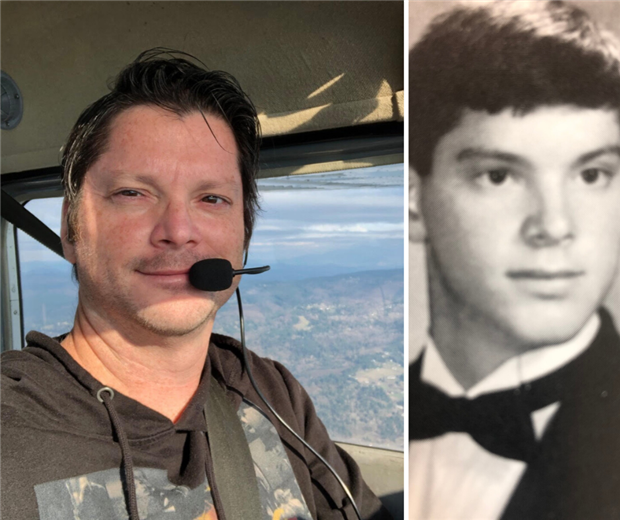

Spotlight on David Ison '91
Source/Author: Stacy Alexander, Director of Alumni and Community Engagement
January 09, 2020
Our Alumni Spotlights series shares the stories of Shorecrest graduates in all phases of their careers – from emerging leaders to established experts. Our latest spotlight follows the early childhood passion of David Ison ‘91 and how this passion translated to a career in aviation and now education.
Share a little about your education post Shorecrest and your career path.
Following my senior year at Shorecrest, I attended Auburn University to study aviation management and to finish earning my pilot certifications. About ten years later, while working as a pilot, I received my Master's of Aeronautical Science degree from Embry-Riddle Aeronautical University. Then a few years following that, I earned my PhD in Higher Education Leadership with a Specialization in Aviation Higher Education from the University of Nebraska - Lincoln.
How did you become interested in flying and aviation?
I have loved planes for as long as I can remember. As a kid, I would beg my parents to drive through the Tampa Airport loop every time we were passing by so I could watch planes. I'd even roll down the windows so I could hear the planes and smell the jet fuel. I had gotten my hands on the original release of Microsoft's Flight Simulator for my Commodore 64 computer and played it incessantly.
My dad finally asked if I wanted to fly the real thing. Of course, I said yes. So at the age of 13, I took my first flight. The rest was history. I continued to fly regularly and earned my pilot certificates at the earliest age for each level. I was very lucky to be selected to work as a flight instructor at Auburn University and was hired by ASA Delta Connection upon graduation. I flew for ASA for a few years and then moved on to ATA Airlines, operating charters all over the world. It was not uncommon to be in Hawaii one day and Europe or Africa the next. Sadly, the airline was not in a good position to survive the post-9/11 aviation business landscape and I transitioned into teaching aviation in higher education before the company went out of business.
I initially taught pilot knowledge courses at a small liberal arts college in Billings, Montana - Rocky Mountain College. After about 7 years, I moved to the Portland, Oregon area joining Embry-Riddle Aeronautical University - Worldwide (ERAU). While at ERAU, I began teaching research and statistics more than aviation, so my work focus started to change and, as such, I moved on to my current job.
My dad finally asked if I wanted to fly the real thing. Of course, I said yes. So at the age of 13, I took my first flight. The rest was history. I continued to fly regularly and earned my pilot certificates at the earliest age for each level. I was very lucky to be selected to work as a flight instructor at Auburn University and was hired by ASA Delta Connection upon graduation. I flew for ASA for a few years and then moved on to ATA Airlines, operating charters all over the world. It was not uncommon to be in Hawaii one day and Europe or Africa the next. Sadly, the airline was not in a good position to survive the post-9/11 aviation business landscape and I transitioned into teaching aviation in higher education before the company went out of business.
I initially taught pilot knowledge courses at a small liberal arts college in Billings, Montana - Rocky Mountain College. After about 7 years, I moved to the Portland, Oregon area joining Embry-Riddle Aeronautical University - Worldwide (ERAU). While at ERAU, I began teaching research and statistics more than aviation, so my work focus started to change and, as such, I moved on to my current job.
Describe your current position and your responsibilities.
I am a Professor in the Graduate School at Northcentral University. I currently teach in our Dissertation Completion Pathway (DCP) program which is designed to help students who have been unable to finish their dissertations at other institutions complete with us. The coursework is very writing and research oriented. I also am the Editor for the university's peer-reviewed research journal, the International Journal of Online Graduate Education.
What is one of your favorite things about your job? or What is the most rewarding part of your work?
My favorite part about work is my colleagues. We work together well as a team and are very collaborative. Also, the work environment is very flexible - we all work remotely from across the U.S. The most rewarding part of my job is giving students who had previously been convinced that they may never finish their doctorate degree a second chance. It is great to see when the light bulbs illuminate and they progress through our program.
Do you have a favorite memory, faculty member or event from your time at Shorecrest?
All of the Shorecrest faculty I had in high school prepared me well for the rigors of college academics. A few of them come to mind. Mr. Beaton made history approachable and taught me how to learn it effectively, allowing me to excel in college history courses. Ms. Feinberg's tortuous math tests and exams made those in college math appear relatively easy. But the most influential faculty of all was Dr. Littlefield. In the freezing cold trailer in which his class resided at the time, I learned to write. I mean actually write - and well. I truly believe that he inspired me to become the researcher and writer that I am today. I have written hundreds of trade publication and academic journal articles as well as three books. Thank you all for being such good teachers!
What advice would you give to the graduating class of Chargers?
Author Pat Conroy said, "No story is a straight line. The geometry of a human life is too imperfect and complex, too distorted by the laughter of time and the bewildering intricacies of fate to admit the straight line into its system of laws." I would tell the graduating class to embrace this quote and its significance. My life turned out completely different than what I had anticipated during my senior year in high school. I would also say not to be afraid of taking the indirect path in life and to be open to different forms of work, family, life circumstances, and measures of happiness.
























